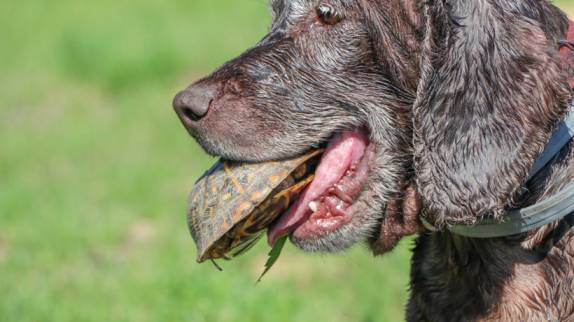With all the talk of human sexually transmitted diseases, you may have wondered if dogs can also catch canine sexually transmitted diseases. The short answer is yes. In this article, we’ll take a look at the most common forms of STDs in dogs and if we can catch these diseases from our fur babies. We’ll also take a look at transmission of STDs in dogs, the symptoms and treatment options for these illnesses.
Connect with a verified veterinarian in minutes. Licensed vets are available 24/7 to answer your questions. No need to worry about your furry family member.
Dog STDs
We don’t often think about dogs being exposed to and catching a sexually transmitted disease; however, just like these illnesses are common in humans, they’re also common in our dogs. It’s also possible for dogs to transmit certain STDs to us, their pet parents, though this is rare. So, it pays to be knowledgeable about canine STDs and how they can be spread among dogs or (rarely) be transmitted to us.
Infected animals can transmit diseases with their genitalia. A direct contact with another animal’s genital can expose your dog to secretions that may contain chv, ctvt or other infectious diseases and if you neuter your dog. Infertility does not protect your animal from infections like inflamed lymph nodes or open sores that pet owners may not be aware of. Sexual contact with reproductive organs can distribute infections across a large number of dogs.
Four Most Common Dog STDs
The four most common canine sexually transmitted diseases include:
- Brucellosis (bacterial infection)
- Canine Herpesvirus (viral infection)
- Canine Transmissible Venereal Tumors (transmissible cancer tumors)
- Chlamydia (not an STD in dogs)
These illnesses can be found in our fur babies; however, they are most often found in stray and feral dogs that have not been spayed or neutered. The diseases are spread when dogs have sexual intercourse, with the results being catastrophic for the puppies. The sad part of these health issues is that they most often effect both unborn and newborn puppies. The unborn puppies may be aborted, while puppies born with one of these diseases usually don’t survive long after their birth.
These diseases are not common in our canine companions; however, it pays to know what to watch for in order to make sure your fur baby is safe from these diseases and/or you seek treatment right away if you suspect they may have one of these conditions.
Dog Brucellosis
Canine brucellosis is one of the least common of dog diseases. It’s caused by the Brucella canis bacterium and most dogs that are at risk from this infection are strays, who have not been spayed or neutered. If your domestic fur baby comes down with this health issue, it is not curable, but it is manageable. However, it’s rare for one of our fur babies to come down with this infection. Brucellosis is passed between dogs who have intercourse or dogs that come into contact with infected bodily fluids. It can also be passed if a dog comes into contact with stillborn puppies from an infected mother, or through contact with the afterbirth from a failed pregnancy.
In addition, a healthy dog can become a host of the disease through ingestion or contact with infected urine from another dog. Signs and symptoms are difficult to detect in a female dog, though if she has a number of failed litters and/or unhealthy puppies, then she should be checked for a possible brucellosis infection. In male dogs, that haven’t been neutered, the testicles can swell and then become shriveled. Brucellosis can be transmissible to humans; this is known as a zoonotic disease. However, it is difficult to catch from a dog. It can happen but is rare. Most often it can happen when people are regularly in contact with pregnant dogs. This can range from a breeder to a veterinarian if they handle the infected fluids or tissues when a dog gives birth. The people at the highest risk are those who don’t wear protective gear and those who are immunocompromised, meaning it is very rare for a person to contract this disease.
Dog Herpesvirus
This is another disease that affects unborn puppies. In fact, if a mother dog is pregnant and exposed to the virus, the unborn puppies will die. This is also the case if the mother is exposed to the viral infection after giving birth—the puppies will become sick and die. This virus only has a 3-day incubation period and can cause everything from changes in breathing, to appetite loss and vomiting. Puppies exposed early after birth usually die within two days. However, puppies that are over three weeks old are usually able to fight off the virus successfully. By this age, puppies generally have a stronger immune system to fight off such infections.
The virus is spread through sexual activity but can also be transmitted through mucus in the mouth or nose. Anything to do with licking, biting, sniffing can put a dog in danger of catching this disease. Adult dogs rarely show symptoms of canine herpes infection. You may notice your female dog loses litter after litter, or if her puppies survive birth, they may not live very long. Another sign can include kennel cough. If you have puppies who seem to not be doing well, it’s important to get them to the vet as soon as possible. The vet will check them for a herpes infection and begin treatment and supportive care. Puppies will need to be kept warm. Even with care and treatment, however, most puppies will not survive.
There is a vaccine available in Europe for canine herpes, which can be given to adult dogs. But the vaccine is not yet available in other countries.
Dog Venereal Tumors or CVT
This is another canine sexually transmitted disease, which is also spread through sexual activity, biting and licking or sniffing of the vaginal or penile areas. The tumors spread through contact with an infected dog’s bodily fluids. The tumors of CVT most often appear on a dog’s vaginal or penile area and resemble warts. The tumors may also, rarely, develop near the mouth and nose. This infection is most common in warm, humid areas and requires surgical removal. Treatment may also include chemotherapy or radiation. This is a non-life-threatening cancer; however, it can easily spread if not treated and ignored.
Chlamydia in Dogs
We know that chlamydia is a sexually transmitted disease in humans; however, in dogs, this is not an STD. The canine version of chlamydia is caused by a different bacterium called Chlamydia psittaci. If this isn’t an STD in dogs, then how do they catch it? We warn you…this is gross…dogs catch it when they come into contact with bird poo or dead birds. Dogs do not catch this from contact with the bodily fluids of other dogs—only when they come in contact with a dead bird or bird poo. Yuck.
Symptoms of chlamydia in dogs look different than in humans. In fact, it will usually show up in a dog’s eyes. His eyes may appear red, inflamed and swollen, and he may try to unceasingly try to scratch his eyes. You may also notice his eyes are watering and/or producing a discharge. These are all the typical symptoms of a chlamydia infection in dogs. It’s important to know that left untreated, chlamydia in dogs can lead to pneumonia. If your vet diagnoses your fur baby with this disease, they typically prescribe tetracycline for the infection, and the treatment cycle will last about 3-4 weeks. Doxycycline is also sometimes prescribed for the same length of time. The full recovery time will be about 4-6 weeks. During the illness, your pup may appear tired and in some discomfort, but after a couple of weeks on the antibiotic, he will start to feel better and be back to his old self.
Bacterial Vaginosis
Bacterial vaginosis is an STD that can develop in female dogs. The condition is caused when normal bacteria become too numerous in the vaginal area.
Symptoms of vaginosis include:
- Foul-smelling discharge
- Itching
- Licking the area
- Irritation
- Pain when mating
- Pain when urinating
- Grey/white discharge
This condition can cause breeding issues in dogs. Bacterial vaginosis is spread through sexual intercourse when an infected dog contacts the genitals of another dog.

Review symptoms, medications & behavior to keep your pets healthy with a Vet Online in just minutes.
Ask a Vet Live NowCommonly Asked Questions About Dog STDs
During the course of our research, we came across some commonly asked questions about STDs, dogs and humans. Let’s take a look at these questions.
1. Can dogs get chlamydia from humans
We have not found information that dogs can get chlamydia from humans; however, it may be possible for us to get the pneumonia form of the disease from our dogs. This is why it’s imperative to have your fur baby treated for the infection as soon as possible. Left untreated, the infection can develop into pneumonia, which could be caught by other pets or even us.
2. Can you get an STD from a dog licking
While rare, yes, it’s possible to get an STD from your pup’s kisses. The most common STD we can catch from our pups is canine brucellosis, which affects about 500,00 people each year, mostly in the Mediterranean and the Middle East. People who have compromised immune systems are more susceptible to this illness, as are young children.
3. What about a dog STD test?
Yes, there are STD tests for dogs, including a test for brucellosis. Be sure to check with your vet about specific tests that may be available for your fur baby.
4. Can dogs get gonorrhea?
No, dogs don’t seem to be susceptible to this form of sexually transmitted disease from humans.
5. Can a dog get syphilis from a human?
No it doesn’t appear that dogs can catch syphilis from a human.
6. How Are Dog STDs Treated?
Treatment for STDs depends on the cause of the condition and the severity of the infection. Treatment also depends on each individual dog and their situation.
Canine herpes doesn’t have a specific treatment. Vets may offer supportive care that helps support the dog’s immune system as it fights the infection.
In addition, antiviral medications may be beneficial. Antibiotics may be used to fight secondary infections. Intravenous fluids may also be used to prevent or cure dehydration.
When it comes to canine brucellosis, antibiotics are required to treat this canine STD. The normal course lasts between 6-8 weeks. In addition, the dog may be neutered to keep the infection from spreading. This is a zoonotic disease, which means canine brucellosis can infect humans. So, care must be taken when working with a dog who has this condition.
CTVT usually requires surgery to remove the tumors. The dog may also require chemotherapy, along with supportive care. The earlier this infection is diagnosed, the better the outcome is for the dog.
Bacterial vaginosis is treated with antibiotics, either orally or applied topically to the area. Dogs with this condition should not lick or rub themselves. In addition, the areas near their genitals need to be kept clean.
How to Prevent STDs in Your Dog
Most of the canine forms of STDs are pretty rare; however, there is one thing you can do to help keep your fur baby safe—get him/her neutered or spayed. Most STDs are common in strays that have not been “fixed,” and that have no veterinary care. Keeping your dog in the yard, where he’s unlikely to come into contact with strays, is another way to keep him protected. Prevention is the best medicine; however, if you suspect your pup may have an STD, then be sure to take him to the vet as soon as possible for evaluation and treatment. Many diseases, left untreated, can quickly become more serious, potentially even threatening your dog’s life. Early diagnosis and treatment will keep this from happening.
As you can see, dogs can catch sexually transmitted diseases; however, these are canine versions and not caught from humans. It’s good to know that it is possible to catch brucellosis and canine herpesvirus from our canine companions, so it’s best to take precautions, especially if you have a compromised immune system.
Connect with a verified veterinarian in minutes. Licensed vets are available 24/7 to answer your questions. No need to worry about your furry family member.

Kyoko
Kyoko is from a family of 3 and moved to New York with her parents and siblings when she was 13. Kyoko is fond of spending a great amount of time with pets, specifically her beagle Luna and cat Missy. Her boyfriend often complains that she spends too much time giving attention to their animals. Kyoko has written dozens of articles concerning pets and is aiming at owning a pet shop one day!
Review symptoms, medications & behavior to keep your pets healthy with a Vet Online in just minutes.
Ask a Vet Live Now



